Dessert is served!
Sometimes you need something sweet, full stop — and more power to you. The only problem: When you eat the processed or baked treats you really crave, your blood sugar spikes, which triggers the release of insulin and leaves you susceptible to storing excess blood sugar as fat — particularly in the belly area, according to registered dietitian Alissa Rumsey, spokesperson for the Academy of Nutrition and Dietetics. Even worse, eating foods full of added sugars can increase your risk of cardiovascular disease and diabetes.
But it doesn't have to be that way. You can hit the spot with foods that get their sweetness from nature, not added sugar. Because naturally sweet-tasting foods tend to pack worthwhile nutrients, they're a far superior way to satisfy your cravings without sacrificing your health.
Enjoy:
1. Natural Nut Butter

Unlike processed peanut butters — i.e. most blended nut butter brands you grew up on — natural nut butters typically don't contain added sugars, usually just roasted peanuts and salt (but check the label). When your palate adjusts to the flavor of the natural stuff, you'll realize it still tastes slightly sweet and seriously hits the spot.
2. A Little Bit of Honey or Maple Syrup
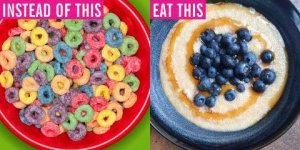
Natural sweeteners like maple syrup or honey contain around 5 grams of sugar per teaspoon. However, although they may sound better for you than white sugar, once you ingest them, your body treats them exactly the same way. But so long as you don't spend the rest of your day plowing through old Halloween candy, it's OK to add a little sweet stuff to your oatmeal or yogurt if it's the only way to make your breakfast palatable, according to Rumsey.
Just don't kid yourself into thinking your pure maple syrup or honey makes food all that healthier. "I [still] don't think we should be getting our nutrients from sugar," says registered dietitian You do not have permission to view the full content of this post. Log in or register now., founder of the nutrition coaching company You do not have permission to view the full content of this post. Log in or register now.. So cap it at a modest drizzle (or, better yet, train your taste buds to rely on the sweetness of fruit like chopped apples to sweeten plain cereals, yogurts, and oatmeal).
3. Vanilla Extract
Yogurt already contains natural milk sugars, but flavored yogurts can tack on astronomical amounts of added sugar or expose you to artificial sweeteners, many of which are so sweet that it becomes difficult for your taste buds to register (and really appreciate) more subtle sources of sweetness. But add a couple drops of vanilla extract to unflavored Greek or regular yogurt, and you'll discover major flavor without any sugar, according to Rumsey.
4. Cherries and Berries and Every Other Delicious Fruit
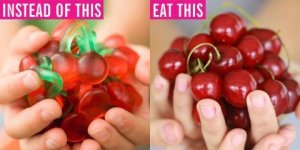
Loaded with antioxidants and fiber, fruits are naturally sweet and packed with additional vitamins and minerals plus fiber, which helps to blunt the blood sugar roller coaster that plagues candy eaters. As long as you keep your portion sizes in check — yes, there is such a thing as eating too much fruit — you won't get that big blood sugar spike. Rumsey recommends sticking with 1 cup of berries or chopped fruit, and eating no more than two or three daily servings of fruit (a 1-cup serving, a medium piece of fruit, or half of a larger one).
5. Frozen Bananas
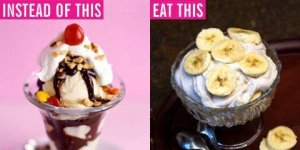
Frozen bananas get a special ~*sHoUt-OuT~* because they make such a solid stand-in for ice cream. In case you've been living underneath a whipped cream mountain with a cherry on top: Real frozen treats tend to be made up of cream andlots of sugar. But blend frozen ripe bananas — no sugar needed — and you won't miss the real thing.
6. Wine

Of course fruit's cooler, older cousin makes the cut. That's because its natural sweetness comes from fermentation as opposed to added sugars (I see you, frozen margarita), and means it beats soda and syrupy cocktails every single time. That moderate wine drinkers tend to have aYou do not have permission to view the full content of this post. Log in or register now. of heart disease only ~sweetens~ the deal. Besides, can you think of anything better than satisfying your sweet tooth while you get a buzz?
Rumsey says the health benefits of wine top out around about a glass of wine per day for women, however. That's 5 ounces if you're counting (I know, but you really should).
7. Corn
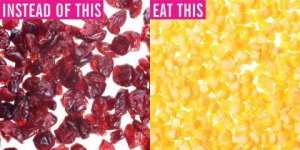
You do not have permission to view the full content of this post. Log in or register now. with jobs at real restaurants are using corn as an ice cream base because the stuff — particularly in the summer time — is so satisfyingly sweet. Unlike craisins, which can contain nearly as much added sugar as candy, corn is a starchy vegetable that naturally tastes sweet. Plus, corn serves up fiber, vitamins, minerals, and antioxidants — and you just can't say the same thing about candied fruits and nuts you find in trail mix and on top of salads, which might as well be eaten straight-up and called dessert.
Instead, toss fresh corn kernels with your salad or roast them as a side, and you might not need something sweet to top off your meal.
8. Grilled or Roasted Veggies

Grilling or roasting vegetables changes the composition of natural starches and brings out their natural sweetness. This makes roasted tomato or grilled onions a perfect sandwich or burger topper — and an ideal stand-in for condiments like ketchup, relish, or chutney, which are often sweetened with high-fructose corn syrup.
9. Herbal Tea

Unlike bitter black teas, rooibos, cinnamon, and even chamomile teas can taste sweet without a single sugar packet. "They get their sweetness from the herbs, so as long as it isn't a bottled tea drink with added sugar, it is a healthy beverage choice," Rumsey confirms.
10. Green Smoothies
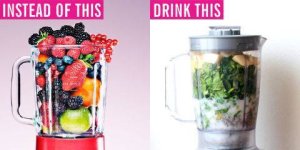
Liquid lettuce doesn't sound like much of a treat, but wait for it: Combine it with a little bit of fruit, and you'll disagree. So long as you cap your recipe at 1 cup of fruit, a green smoothie packs more nutrients and less sugar than the typical fruit-based smoothie, and it has extra fiber, which slows the absorption of sugar into the blood stream and prevents the ol' sugar high and sugar crash in turn. Just look out for store-bought smoothies and bottled ones: Large serving sizes of fruit-sweetened green smoothies can still serve up way more sugar than anyone needs to consume in one sitting (more than 15 grams of sugar means it probably contains more than that 1 cup cap).
11. Balsamic Vinegar
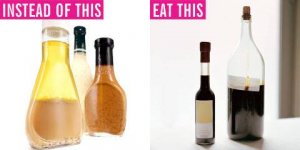
Made from fermented sweet grapes, balsamic vinegar adds a natural sweetness to salads without the added sugar found in so many processed dressings. And while added sugars are OK in small amounts, according to Rumsey, they usually signify a highly processed food item — something you just don't need to douse your veggies in when a much simpler recipe (i.e. olive oil and vinegar) can taste just as good.
© cosmo mags.
Sometimes you need something sweet, full stop — and more power to you. The only problem: When you eat the processed or baked treats you really crave, your blood sugar spikes, which triggers the release of insulin and leaves you susceptible to storing excess blood sugar as fat — particularly in the belly area, according to registered dietitian Alissa Rumsey, spokesperson for the Academy of Nutrition and Dietetics. Even worse, eating foods full of added sugars can increase your risk of cardiovascular disease and diabetes.
But it doesn't have to be that way. You can hit the spot with foods that get their sweetness from nature, not added sugar. Because naturally sweet-tasting foods tend to pack worthwhile nutrients, they're a far superior way to satisfy your cravings without sacrificing your health.
Enjoy:
1. Natural Nut Butter

Unlike processed peanut butters — i.e. most blended nut butter brands you grew up on — natural nut butters typically don't contain added sugars, usually just roasted peanuts and salt (but check the label). When your palate adjusts to the flavor of the natural stuff, you'll realize it still tastes slightly sweet and seriously hits the spot.
2. A Little Bit of Honey or Maple Syrup

Natural sweeteners like maple syrup or honey contain around 5 grams of sugar per teaspoon. However, although they may sound better for you than white sugar, once you ingest them, your body treats them exactly the same way. But so long as you don't spend the rest of your day plowing through old Halloween candy, it's OK to add a little sweet stuff to your oatmeal or yogurt if it's the only way to make your breakfast palatable, according to Rumsey.
Just don't kid yourself into thinking your pure maple syrup or honey makes food all that healthier. "I [still] don't think we should be getting our nutrients from sugar," says registered dietitian You do not have permission to view the full content of this post. Log in or register now., founder of the nutrition coaching company You do not have permission to view the full content of this post. Log in or register now.. So cap it at a modest drizzle (or, better yet, train your taste buds to rely on the sweetness of fruit like chopped apples to sweeten plain cereals, yogurts, and oatmeal).
3. Vanilla Extract
Yogurt already contains natural milk sugars, but flavored yogurts can tack on astronomical amounts of added sugar or expose you to artificial sweeteners, many of which are so sweet that it becomes difficult for your taste buds to register (and really appreciate) more subtle sources of sweetness. But add a couple drops of vanilla extract to unflavored Greek or regular yogurt, and you'll discover major flavor without any sugar, according to Rumsey.
4. Cherries and Berries and Every Other Delicious Fruit

Loaded with antioxidants and fiber, fruits are naturally sweet and packed with additional vitamins and minerals plus fiber, which helps to blunt the blood sugar roller coaster that plagues candy eaters. As long as you keep your portion sizes in check — yes, there is such a thing as eating too much fruit — you won't get that big blood sugar spike. Rumsey recommends sticking with 1 cup of berries or chopped fruit, and eating no more than two or three daily servings of fruit (a 1-cup serving, a medium piece of fruit, or half of a larger one).
5. Frozen Bananas

Frozen bananas get a special ~*sHoUt-OuT~* because they make such a solid stand-in for ice cream. In case you've been living underneath a whipped cream mountain with a cherry on top: Real frozen treats tend to be made up of cream andlots of sugar. But blend frozen ripe bananas — no sugar needed — and you won't miss the real thing.
6. Wine

Of course fruit's cooler, older cousin makes the cut. That's because its natural sweetness comes from fermentation as opposed to added sugars (I see you, frozen margarita), and means it beats soda and syrupy cocktails every single time. That moderate wine drinkers tend to have aYou do not have permission to view the full content of this post. Log in or register now. of heart disease only ~sweetens~ the deal. Besides, can you think of anything better than satisfying your sweet tooth while you get a buzz?
Rumsey says the health benefits of wine top out around about a glass of wine per day for women, however. That's 5 ounces if you're counting (I know, but you really should).
7. Corn

You do not have permission to view the full content of this post. Log in or register now. with jobs at real restaurants are using corn as an ice cream base because the stuff — particularly in the summer time — is so satisfyingly sweet. Unlike craisins, which can contain nearly as much added sugar as candy, corn is a starchy vegetable that naturally tastes sweet. Plus, corn serves up fiber, vitamins, minerals, and antioxidants — and you just can't say the same thing about candied fruits and nuts you find in trail mix and on top of salads, which might as well be eaten straight-up and called dessert.
Instead, toss fresh corn kernels with your salad or roast them as a side, and you might not need something sweet to top off your meal.
8. Grilled or Roasted Veggies

Grilling or roasting vegetables changes the composition of natural starches and brings out their natural sweetness. This makes roasted tomato or grilled onions a perfect sandwich or burger topper — and an ideal stand-in for condiments like ketchup, relish, or chutney, which are often sweetened with high-fructose corn syrup.
9. Herbal Tea

Unlike bitter black teas, rooibos, cinnamon, and even chamomile teas can taste sweet without a single sugar packet. "They get their sweetness from the herbs, so as long as it isn't a bottled tea drink with added sugar, it is a healthy beverage choice," Rumsey confirms.
10. Green Smoothies

Liquid lettuce doesn't sound like much of a treat, but wait for it: Combine it with a little bit of fruit, and you'll disagree. So long as you cap your recipe at 1 cup of fruit, a green smoothie packs more nutrients and less sugar than the typical fruit-based smoothie, and it has extra fiber, which slows the absorption of sugar into the blood stream and prevents the ol' sugar high and sugar crash in turn. Just look out for store-bought smoothies and bottled ones: Large serving sizes of fruit-sweetened green smoothies can still serve up way more sugar than anyone needs to consume in one sitting (more than 15 grams of sugar means it probably contains more than that 1 cup cap).
11. Balsamic Vinegar

Made from fermented sweet grapes, balsamic vinegar adds a natural sweetness to salads without the added sugar found in so many processed dressings. And while added sugars are OK in small amounts, according to Rumsey, they usually signify a highly processed food item — something you just don't need to douse your veggies in when a much simpler recipe (i.e. olive oil and vinegar) can taste just as good.
© cosmo mags.
Attachments
-
You do not have permission to view the full content of this post. Log in or register now.